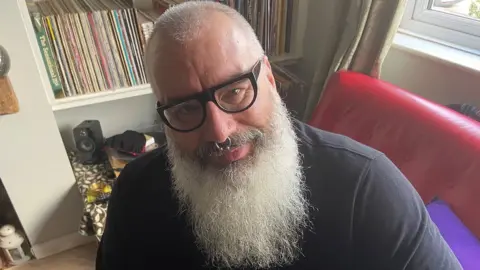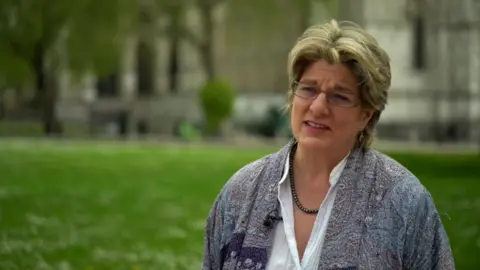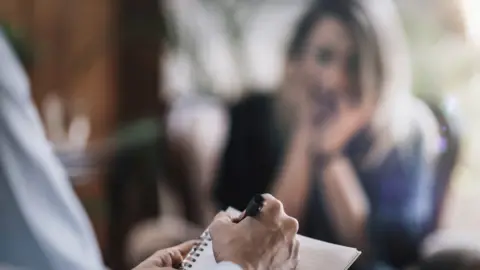'I was told I'd be delivered from homosexuality'
 Dean Fudge
Dean Fudge"I felt like I was running a personal wholeness course. That's how it was sold to me."
Dean Fudge was subjected to so-called conversion therapy by a religious group for several years, before going on to offer it to others.
"I attempted over those 15 years to change my sexuality. I was taught that was the right thing to do, I was married and my wife knew I was gay. We were both told that God would intervene, but that didn't happen."
By then Dean was seen as a "success story" by the group, which still practises, because he was married to a woman and had gone through the programme several times.
He went on to lecture around the world about how a person's upbringing could influence their sexuality. Although he knew inside that he was still gay, he believed conversion therapy worked for others.
"I thought it was my problem that it wasn't working. It was all wrapped up with becoming a better person, becoming a better Christian.
"When I talked about my story I wasn't entirely honest and said 'the gay part doesn't go away you know'. I taught the cod-Freudian approach that you can blame all of your problems on your mum and dad with no qualifications."
Dean did not come out until his late 40s and says he suffers from post-traumatic stress triggered by the "personal wholeness course", which included "exorcisms" to rid him of demons.
"There is a lot of guilt and shame heaped on to queer people in conversion therapy groups, they are told it should work. I was told I would be delivered from the demon of homosexuality," he says.
A six-week public consultation opens on Friday over how best to end conversion therapy, which is described by health bodies as an attempt to change or suppress someone's sexual orientation or gender identity.
This generally entails trying to stop or suppress someone from being gay, or from living as a different gender to their sex recorded at birth.
A 2018 survey estimated 5% of LGBT people have been offered conversion therapy, and 2% have experienced it.
A ban was first mooted in the same year, and the new proposals include stronger legislation for England and Wales, including creating a new criminal offence.
Minister for Women and Equalities Liz Truss, said: "There should be no place for the abhorrent practice of coercive conversion therapy in our society."
Dean says that while he would "definitely be in favour of an outright ban", he still welcomes the idea of tighter laws.
"It will give someone experiencing conversion therapy a way to say that this is against the law and I'm going to take action - I think it will be a deterrent."
Anti-abuse charity Galop has launched a national helpline for anyone who may be traumatised by reliving their experiences.
"The conversion therapy ban is a step forward for our community, but we know that the spotlight it gives to these practices may cause pain and trauma to those who are experiencing these abuses right now, or have been through them in the past," chief executive Leni Morris said.

The government says it wants to safeguard genuine therapists and religious freedom while protecting people from harm, and hopes survivors of conversion therapy and LGBT, religious and medical groups will take part in the consultation.
For physical violence, such as rape and assault, conversion therapy will be considered as an aggravating factor during sentencing.
But the consultation notes that victims testify conversion therapy is often non-violent, although it does not include "casual conversations, exchanges of views, private prayer or pure speech acts".
In this context, the government says that it also intends to make administering "talking therapy" for under-18s or non-consenting adults a criminal offence.
Consenting adults will still be allowed to seek out this talking therapy, but there will be "robust and stringent" measures in place, including a requirement for them to have been informed about its potential impact.
The consultation also adds that psychologists, counsellors and other clinicians and healthcare staff shouldn't be prevented from "providing legitimate support for those who may be questioning if they are LGBT".
 Getty Images
Getty ImagesFormer equality adviser Jayne Ozanne, who campaigns against conversion therapy, said she welcomed the consultation launch, but was "deeply concerned about the loophole it creates by allowing adults to consent to these harmful and degrading practices".
"The consultation document makes little mention of the harm that religious practices are known to cause, nor does it recognise that the government's own research has shown that these form the majority of such practices in the UK - instead it focuses on "talking therapies" in clinical settings," she says.
The government says "everyday religious practice" will not be affected by the proposals, and that for example, "an adult who wants to be supported to be celibate will be free to do so".
The Evangelical Alliance, which says it represents 3,500 churches, said it welcomed the idea that the consultation would "safeguard spiritual support for those who want it".
"Our concern is that some campaigners will push to see everyday Christian practices such as prayer and pastoral care criminalised, and so the Evangelical Alliance will be encouraging its members to respond to this consultation," UK director Peter Lynas said.
The consultation also contains a range of other suggested measures including:
- Conversion therapy protection orders
- Restricting promotion of conversion therapy, including online
- Removing profit streams from perpetrators
- Making it easier to disqualify a perpetrator from holding a senior role in a charity
Correction 12 November: An earlier version of this article said that the government's open consultation on banning conversion therapy noted this can include "casual conversations, exchanges of views, private prayer or pure speech acts". In fact these are actions which the consultation said could not reasonably be understood as talking conversion therapy and we have amended our article accordingly.
